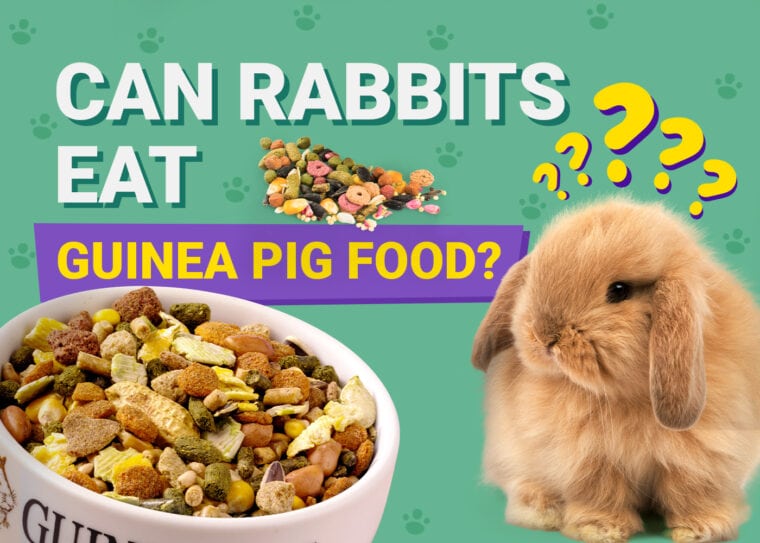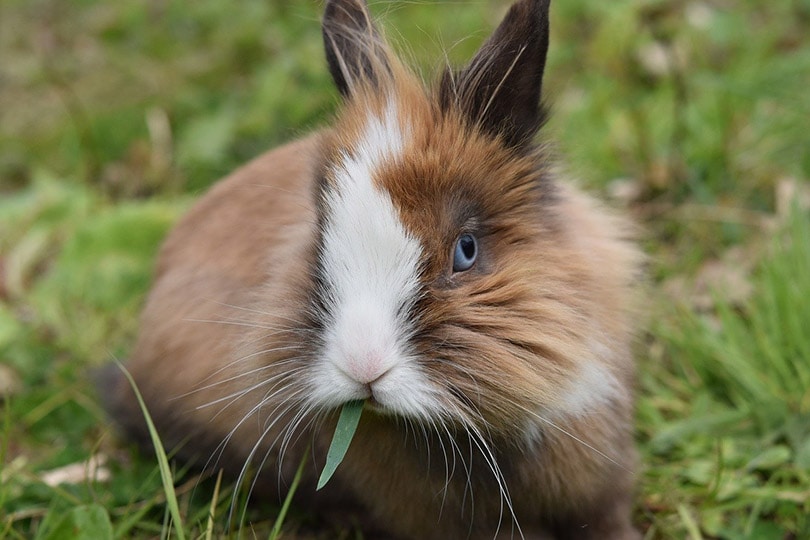
Rabbits and guinea pigs are popular pets for individuals that don’t have the space or are able to keep larger animals like cats and dogs. An estimated 2.24 million bunnies1 and 3.8 million cavies live in the United States2. The two species are similar in several ways that you may wonder if you can give them the same food. After all, they’re both herbivores with a long history of being domesticated.
While feeding a rabbit guinea pig food on a short-term basis won’t hurt your pet, we don’t recommend it as a long-term diet. Several biological differences exist between the two species that support this conclusion. Let’s dig a bit deeper into this question to find the specific reasons.

The Recommended Animal Diets
Domesticated rabbits and guinea pigs are far removed from their wild ancestors, so we’ll focus our discussion on them.
Rabbits
Rabbits have specialized feeding needs and digestive systems. They are selective eaters and choose nutrient-rich leaves and new plant shoots over mature plant material that is higher in fiber whenever the opportunity presents itself. Rabbits are therefore considered concentrate selectors because they naturally pick and choose foods higher in energy density, which predisposes them to obesity in captivity. Therefore, controlling their diet is crucial to their long-term health.

Guinea Pigs
Remember that these animals are smaller than most rabbits, weighing 1.5–2.5 pounds. The recommended daily diet for cavies is similar, with unlimited amounts for hay, a cup of greens (vegetables higher in Vitamin C are preferred), and guinea pig pellets, if needed. Hay is necessary for its fiber content and benefits for digestive health. It also keeps both species’ teeth trimmed since they grow throughout the animals’ lives.
Examples of appropriate hay for guinea pigs include timothy, orchard, grass, and oat hay. Hay, in conjunction with pellets, should form the overwhelming bulk of their diet (approximately 80-90%).

Vitamin C
Rabbits, like cats and dogs, can synthesize vitamin C in their livers. It is the same as the natural form in foods and beverages. Guinea pigs—and humans—cannot. Therefore, we and our pets must get it from our diet. Therein lies one significant difference between rabbit and cavy food. The latter contains this nutrient.

Can Rabbits Eat Guinea Pig Pellets?
For rabbits, the good news is that guinea pig pellets aren’t toxic. The main difference in most guinea pig pellets (when compared to rabbit pellets) is the extra addition of vitamin C. Interestingly, this process seems to hike up the price of these pellets as well, and guinea pig pellets seem to impact an owner’s wallet more than rabbit pellets do.
Given a rabbit’s eating habits, they may show a preference for pellets. Consuming too much vitamin C—which can happen if your rabbit regularly eats excessive amounts of guinea pig food—could promote kidney stones and reduce the amount of other vitamins, such as vitamin B12 within the rabbit’s body. Therefore, portion control remains important if you’re housing both these pets together. The excess vitamin C cannot be stored within a rabbit’s body and must be eliminated by their kidneys.
It is worth noting that, in some instances, supplementing a rabbit’s diet with vitamin C can be beneficial (for example, if a rabbit has liver issues or is recovering from an illness). Furthermore, in some cases, Vitamin C can be used in rabbits to treat some renal issues; therefore, the inclusion of guinea pig pellets might be beneficial in some circumstances.
A major downside but potential safety net of guinea pig pellets is that though they are fortified with vitamin C, the vitamin itself doesn’t last as long as the pellets do. The vitamin C in guinea pig pellets can degrade in a matter of months once the container is opened. Therefore, depending on when you opened the bag, they might not contain excessively high amounts of Vitamin C in them. This is part of the reason why vegetables are recommended for guinea pigs (to ensure they can meet their vitamin C requirements).
Another factor to consider for both guinea pigs and rabbits is that their primary diet consists of high quality hay fed in unlimited amounts. Pellets for both these pets should be offered in smaller amounts than hay, so in practice, consumption of small amounts of pellets intended for another pet isn’t an immediate cause for major concern.
These factors indicate that guinea pig pellets aren’t overly dangerous for rabbits, but it would be best if they had their own pellets to eat (it’ll also be easier on your wallet).

Final Thoughts
Rabbits and guinea pigs have similar dietary needs that are reflected in the commercial foods they eat. The notable exception is the vitamin C content found in products for the latter. While feeding your rabbit guinea pig food isn’t harmful in the short term, it isn’t something you should look to do on a regular or long-term basis.
- Related Read: Can Guinea Pigs Eat Rabbit Food? What You Need To Know!










